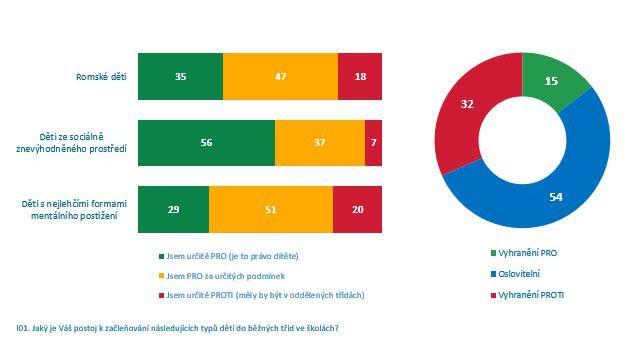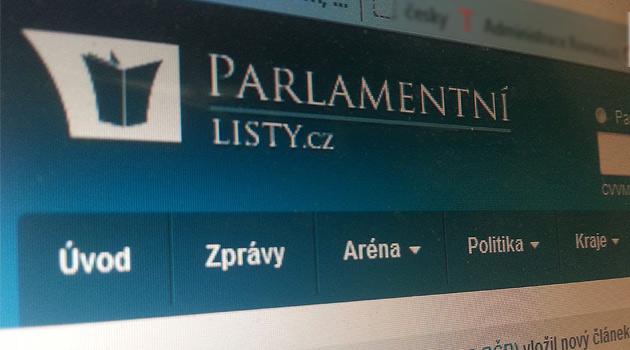Czech survey finds most people not opposed to inclusion, but children living with disabilities or Romani children raise concerns

Most people in the Czech Republic (53 %) are not against including children living with disabilities into mainstream classes as long as certain conditions are fulfilled. The groups of people who have extreme opinions about inclusion – whether against it or for it – are smaller.
Roughly 32 % of those surveyed are extremely opposed to inclusion, while those who are 100 % in favor of it comprise about 15 % of those surveyed. This most recent survey was performed by the EDUin, Median and Socialbareks groups.
It might seem from general surveys asking “What is your stance on inclusion?” that the vast majority of Czech society takes an extreme stance against educating all children together, but surveys that involve more detail demonstrate that the situation is not so unequivocal. A negative position toward inclusion is influenced mainly by fear, according to this most recent analysis.
People are concerned that the inclusion of children living with disabilities has not been well-prepared and is not well-secured in terms of staffing in the schools. The survey reveals that these concerns are also shared by those who otherwise agree with inclusion.
Arguments that are conspiratorial in nature (e.g., that nonprofit organizations are advocating for inclusion, or that inclusion is about supporting Romani children to the detriment of other children) have the least support among those surveyed, but despite that, the sharing of conspiracy theories about inclusion is relatively strong. Most of those surveyed said they would be in favor of inclusion if, for example, there would be a maximum limit of 20 children in such a class.
Those surveyed said they also consider an essential component of inclusion to be the consent of the parents of children living with disabilities to enrolling the child in a mainstream class, a positive assessment of such inclusion by a psychologist, and the presence of an assistant in such a class. According to Bob Kartous of the EDUin association, the survey findings demonstrate that the position of the public toward inclusion is not as critical as it might seem at first glance from articles about it in the media and the discussions about it through online social networking sites.
“Given the populist rhetoric equating inclusion with crimes against children, or with experiments on children, the fact that most people are not extremely against it is basically a positive thing. It is, however, necessary – especially from the side of the Czech Education Ministry – to respond to the fact that not even adherents of inclusion are convinced that the transition to the new system of support for pupils with special educational needs has been well-directed or well provided for,” Kartous said in a press release from EDUin.
Analysis finds least support for including children living with mental disability and Romani children
Respondents say they are afraid that teachers are not prepared to instruct so-called “problematic” children. Some said they believe inclusion will damage the Czech schools as a whole.
“We interpret that to mean that previously the education system was perceived as good, but now, according to some people, it is functioning worse, and there is concern here that it will become even worse,” said Kartous, who is one of the authors of the survey. The least support, according to the analysis, is expressed for including children living with mental disability or Romani children into mainstream education.
When the term “socially disadvantaged children” is used, that sparks the least resistance among people. It seems that the image provided by online social networks does not reflect the actual state of public opinion, because extreme opponents of inclusion especially express themselves there.
The most extreme opponents to the inclusion of children living with disabilities are young people aged 18-29. Respondents’ levels of educational attainment are not determinative of their position on the issue.
There are noticeable differences among the promoters of various political parties on this issue. The most extreme opponents of inclusion are the promoters of Czech President Miloš Zeman, conservative left-wingers, and xenophobic parties, the authors of the survey said.
A total of 1 027 people from all over the Czech Republic were asked for their opinions on the issue. Positions on inclusion differ depending on the preferred media followed by the respondents.
Readers of the tabloid Blesk are generally least tolerant, and their willingness to accept arguments in favor of inclusion is low. It is interesting, however, to note the position taken by readers of the daily Právo, who said they would probably change their position just on the basis of being better-informed about what it means to educate pupils together.
New rules for inclusion were introduced last September by an amendment to the Education Act about which there was a tempestuous discssion and against which Zeman made several statements. According to the advocates for that bill, the new law will improve support for the children living with disabilities who already are attending mainstream schools.
Infographics from the survey are HERE (Czech only). The complete findings of the survey are HERE (Czech only).
